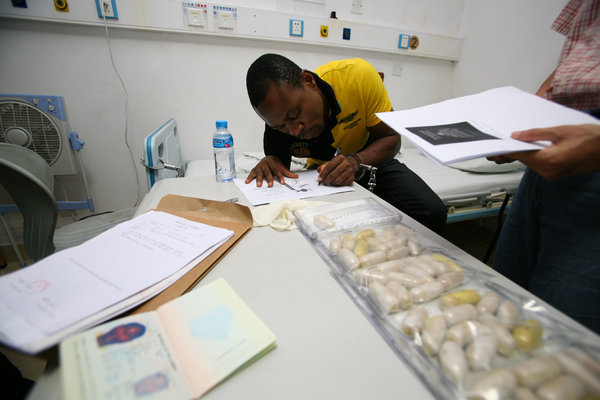Society
Dealers targeting province's rural areas
By Zheng Caixiong (China Daily)
Updated: 2011-06-21 07:58
 |
Large Medium Small |
|
 A man from Gambia signs documents connected to his detention by customs officers in Zhuhai, Guangdong province, on June 9. A total of 1,156 grams of heroin packed in 76 small bags were allegedly found in his stomach as he attempted to enter the province from Macao the day before. [Zhang Jianlin / for China Daily] |
GUANGZHOU - Drug-related crime in Guangdong province is spreading from the big cities into its rural areas, posing new challenges for police, a senior officer said on Monday.
"Now, a lot of methamphetamine - which is commonly known as ice - K-powder, ecstasy pills and other new types of drugs are being found in the province's rural areas," said Wang Junke, director of the anti-drug bureau under Guangdong's provincial department of public security.
|
||||
"K-powder and some new drugs are cheap and many people in the rural areas can afford to take these drugs."
Wang also attributed the growing number of drug cases in rural areas to residents' limited awareness of the dangers.
"Many people have not realized the great harm that drugs do to society and families," he said, pointing out that drugs can damage people's mental abilities.
"Some drug addicts may hallucinate that they are being pursued or attacked by others," he said.
In addition, the widespread use of drugs can accelerate the spread of HIV/AIDS and sexually transmitted diseases, he said.
Wang admitted that fighting drug crime is a long-term and difficult task in Guangdong.
Domestic and foreign drug traffickers and producers are eager to build the province into a major distribution center because of its proximity to Hong Kong and Macao, he said.
But Wang said police will spare no effort in fighting drug-related crime and hinted that additional special campaigns will be launched to fight the problem in the near future.
Wang urged the province's residents to turn their backs on drugs and those involved in the illicit industry and encouraged locals to report suspicious activity to police.
Drug traffickers will not stop producing, trafficking and selling drugs because there is the potential for big profits, he said during a news conference in Guangzhou, the provincial capital.
Guangdong police officers cracked 8,062 drug-related cases between January and May and detained 8,435 suspects while seizing more than 4 tons of drugs.
In 2010, police investigated 15,940 drug-related cases, detained 18,025 suspects and seized 6.28 tons of drugs.
He said officers destroyed 199 drug-producing facilities and broke up 446 drug gangs in 2010.
Among recent breakthroughs were raids at the end of April in Luhe during which officers uncovered two underground drug-producing facilities in the county's Shanghu and Hetian townships and detained eight suspects, seized 12.4 kg of drugs, 500 kg of semi-finished products and tools and equipment.
And in December, officers in Yangjiang broke up a major drug distribution network and two production bases, detained 17 suspects, seized 1,380 grams of heroin and three cars used for the trafficking of drugs.
According to statistics from Wang's bureau, Guangdong now has more than 260,000 registered drug addicts. The figure was 240,000 one year ago.
Wang Fangru, a white-collar worker in Guangzhou's Baiyun district, said she was not surprised to hear the number of drug addicts in Guangzhou had grown in recent years.
"More drug addicts seem to be visiting local bars and other entertainment venues at night looking for drugs," she said.
| 分享按钮 |

